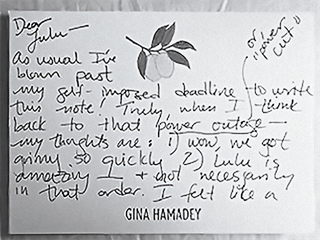Products You May Like
“Will the pool make us cleaner or dirtier?” I asked my husband, lying in the shade and clocking how grimy he and the kids and I all were after two days of no power or running water. It was the summer of 2020, and—after being cooped up in the city for the first few months of COVID—we were living with his parents in the rural Berkshires.
That night, Jake slept upstairs with our two young boys in case of bats. (Keeping one lamp on keeps the bats away. Alas, there was no light, and so my father-in-law had chased one out with a broom the night before.)
It’s hard to deny that this was a low point: We had been living with my in-laws for going on three months, with no child care and only an hour or two of work possible per day. And now we were peeing in the woods, debating whether chlorine is a suitable bathing agent, and trying to sleep in the sweltering heat with no air conditioning. And then, of course, there were bats!
Yet, here’s what my journal at the time reads: “I just finished the Liane Moriarty book I started this morning, and then looked out the window at the beautiful stars and listened to the sounds. So dreamy here. Grateful I found my way back to reading novels.”
A few days later, I wrote this note to my mother-in-law, Lulu: “Truly, when I think back to that power outage—or “power cut” [as the kids called it]—my thoughts are (1) Wow, we got grimy so quickly, and (2) Lulu is amazing. And not necessarily in that order. I felt like a slowly deflating balloon, barely able to accomplish anything aside from reading my book. Meanwhile, I’m watching you on the floor playing with the kids—and then in the kitchen magically putting together a delicious dinner. Your energy and sunny attitude astounded me and continue to do so.”
I’m not the only one who’s been turning to gratitude as a coping mechanism during the pandemic. In February 2021, search terms such as “How to thank the bus driver,” “How to thank a nurse,” and “How to thank a health care provider” began trending. Overall, internet searches for the term “What is gratitude” have increased nearly sixfold, from 1,400 searches in January 2020 to 8,000 in January 2021; over the same period, searches for “gratitude journal prompts” have tripled to a high of nearly 10,000 searches in January 2021.
Buying trends indicate the same. “We’re seeing customers shopping for more gratitude/thankful products across the whole store,” says Paper Source marketing manager Alex Knauf. A pack of simple cards that say “THANK YOU for your kindness and sympathy,” for example, took in $9,000 in 2020—a 290 percent increase from $2,000 in 2019.
Our collective instincts are clearly on to something: Studies show gratitude helps in tough times, and it’s proven especially comforting in the past year. In December 2020, the UK’s University of Surrey posed the question, Which coping mechanism was the most helpful during lockdown: focusing on nostalgia for the past, gratitude for the present, or hope for the future? It found that gratitude and optimism were far more effective for a person’s well-being than nostalgia.
I learned firsthand that gratitude is strong medicine in 2018 when I spent a year writing 365 thank-you notes and gratitude letters. I came up with the concept after writing a stack of thank-you notes to fundraiser donors and noticing how oddly meditative it felt. Peace and calm would come over me like a blanket, and my breathing and heart rate seemed to slow.
That heart-slowing sensation was real, even if I didn’t know it at the time. A 2017 study by the Yonsei University College of Medicine in Seoul examined the effects of gratitude and resentment on mental well-being, using heart rate as one indicator. The average heart rate was significantly lower while the participants were spending four minutes thinking grateful thoughts about their mothers, compared with spending those four minutes focused on moments or people who made them angry.
Each month of my gratitude year was dedicated to a different group of recipients, such as friends, family members, parenting helpers, career mentors, and favorite authors. The eight notes I wrote to my mother-in-law throughout the year changed the dynamic of our relationship: I became more aware of how much she does for our family, and she was touched by how much I noticed.
Among the many gratitude benefits, I experienced was a heightened sense of resilience. Writing the notes not only offered me a short-term feeling of calm, it made it easier to channel positive emotions in general. “Sitting with any feeling, whether positive, neutral, or negative, has the potential to rewire our neural connections due to our neuroplastic brains,” explains Bret Stetka, author of A History of the Human Brain. “When we use any brain network—whether for riding a bike or playing a guitar—those neuronal connections are strengthened and more easily called upon. Expressing gratitude and sitting with your positive feelings towards others bolsters these networks, making it easier for the brain to access that warmth.”
Glenn Fox, a neuroscientist and expert in the science of gratitude at USC’s Marshall School of Business, teaches the power of gratitude and optimism—both in his new mindfulness program for entrepreneurs, called FoundWell, and in his popular 100-person class “The Science of Peak Performance.” When USC canceled classes in the spring of 2020, students were in the middle of writing their three- to four-week optimism journal. He recounts: “It made for this interesting timeline.
Their optimism took a hit, but it recovered quickly.” He has been keeping up his own gratitude practice, which has been helpful while he and his wife have been navigating life with a 10-month-old in close quarters. Every morning he tries to “find the smallest thing in my room or the neighborhood to be grateful for,” he says. “I focus on that and imagine life without it, and then think about how great it is that it’s there. So we have this soft, fluffy blanket, for example. It was a wedding present. I often think about that blanket, and about the friends who gave it to us.”He says he thinks about gratitude all day. “It takes some skill: There are days when you wish you were grateful, but you’re not. Then you’ve got to just breathe, and find the smallest thing around you that’s working.”
Keep in mind: Even when nothing seems to be working the power, the pipes, your city’s infrastructure, your sense of humor—there is always something (or someone) that is. You just have to look.
Gina Hamadey is the author of I Want to Thank You: How a Year of Gratitude Can Bring Joy and Meaning in a Disconnected World (TarcherPerigee).
This article originally appeared in the June/July 2021 issue of ELLE Magazine.
This content is created and maintained by a third party, and imported onto this page to help users provide their email addresses. You may be able to find more information about this and similar content at piano.io





